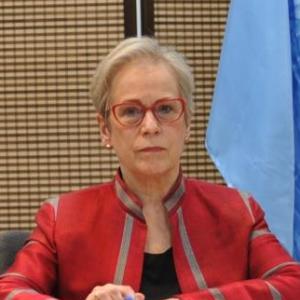Excellencies, Ladies and Gentlemen, Dear Panel members,
On this solemn occasion, let me thank you for the opportunity to participate in the Free Yezidi Foundation panel.
On behalf of the United Nations, let me begin by recalling that the United Nations have not forgotten those who lost their lives in August 2014 or whose whereabouts remain unknown to this day.
Seven years later, on this seventh annual commemoration day of the Yazidi atrocities, we reaffirm our full solidarity with the families who lost their loved ones and pay tribute to the inspiring bravery of the survivors.
As you all know, last October 2020, an agreement was reached between the Federal and Kurdistan Regional governments on administrative, service and security arrangements in the Sinjar district, which entered into force in November 2020.
The Sinjar Agreement was an important step in the right direction to create a conducive environment for stability, security, and better living conditions for the Yazidis and all communities of Sinjar - to put the Sinjari people's interests first.
Excellencies, Ladies and Gentlemen.
To date, representatives of the Federal and Kurdistan Regional governments continue to engage on the Sinjar Agreement's security provisions. A joint committee has been formed to identify potential recruits for the local police.
In this regard, security provisions of the Sinjar Agreement, such as the full withdrawal of all non-state armed actors and their replacement with Iraqi federal forces and local police, have begun but have not yet been fully implemented.
Progress on administrative and reconstruction provisions has unfortunately also been limited thus far. Parties continue to express their willingness to come to the table, but sustainable progress will remain elusive without institutionalized, regular, structured dialogue. It’s due time to walk the talk.
We all know well that lasting peace, development, and prosperity will not be delivered overnight. Yet, a critical first requirement is a stable governance and security framework. Almost everything rests on this foundation.
In a spirit of continued solidarity with the Yazidis, United Nations Special Representative Jeanine Hennis-Plasschaert remains actively engaged with Baghdad and Erbil and has visited Sinjar district several times to follow up on the Sinjar Agreement's implementation and engage with the Sinjari communities.
Thus, the United Nations continue to encourage the Federal and Kurdistan Regional governments and all relevant stakeholders to put aside partisan interests, overcome differences and place the needs of the people above all and do so without further delay.
In this context, reaching an inclusive consensus to establish stable governance and security structures without delay, facilitating the safe and dignified return of Internally Displaced Persons (IDPs) to their homes and the reconstruction of affected areas, remains one of the United Nations priorities. And I can only emphasize our readiness and commitment to help all stakeholders move towards a normalized, sustainable situation on the ground.
Regarding reconstruction and development in the Sinjar district, the United Nations believe that speeding up reconstruction in affected areas would enable the safe return of displaced people in the Sinjar district as a first step to overcoming deep tragedy.
The United Nations continue to provide humanitarian and development support in the Sinjar district. UN Agencies, Funds and Programs have also embarked on supporting survivors through psychosocial support, legal services for missing identification and legal documents, reintegration efforts, local community reconciliation, and reparations.
From our field point of view, the humanitarian and development work at grassroots levels in Sinjar aims to help alleviate the suffering and bring communities back and together. Particularly successful have been projects for agriculture, rehabilitation of houses and villages such as Kocho, schools, and other development and cultural projects, including solar-powered wells, which have been welcomed by the Sinjari communities.
However, the large and sheer scale of needs and investments required go beyond the United Nations mandate. The Sinjar district will need the tireless efforts of all stakeholders, including relevant governmental authorities, to rebuild the infrastructure for better provision of basic services in the future such as water, electricity, housing and health.
Excellencies, Ladies and Gentlemen, Dear Panel members,
I cannot speak in this panel without mentioning the enactment of the Yazidi Female Survivors Law which is a major step towards addressing the needs of survivors of atrocities committed by ISIL. The law's recognition of crimes committed by ISIL against the Yazidis and also Christians, Shabaks, and Turkmen as crimes against humanity and genocide also underscores the need to hold perpetrators of conflict-related sexual violence accountable and provide reparations and redress measures for survivors.
Finally, I would like to reassure this audience that the United Nations Special Representative, Jeanine Hennis-Plasschaert, and the United Nations personnel deployed in Sinjar and across Iraq continue with high dedication and determination to implement the United Nation's mandate in the Sinjar district during extraordinary times and under challenging circumstances. No one has forgotten what happened seven years ago, and the world is surely watching today.
Thank you and blessings to all.


